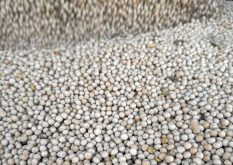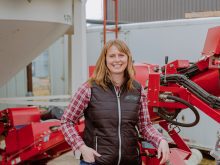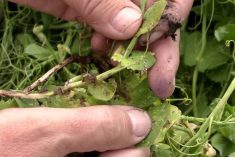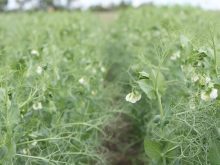The province’s producers grow half of Canada’s pea acres — 1.7 million of the nation’s 3.2 million acres planted this year
The pea protein industry in Western Canada is about to have a new player.
Louis Dreyfus Company (LDC) broke ground on its Yorkton pea plant June 25. The facility will focus on pea protein isolate and represents an effort from the company to gain market share in pulse products.
Healthy demand for pea protein has helped bolster pea production in the eastern Prairies. In 2017, French company Roquette broke ground on its Manitoba pea protein facility in Portage la Prairie. That year, only 65,000 acres of the crop had been planted in Manitoba, according to Statistics Canada.
Read Also

Alberta researcher helps unlock the economics of farming
Lethbridge Polytechnic researcher helping agriculture producers with decision-making tools in economic feasibility
Acreage has jumped in the last five years, helped by drier growing conditions. In 2021, the year Roquette’s plant officially opened its doors, pea acres in Manitoba reached almost 213,000. This year, the agency estimates 191,400 acres were seeded to peas.
Brian Conn, LDC’s Canadian head, said Yorkton meets all the company’s location requirements.
“Yorkton is an ideal location from an origination standpoint. We have a great base of growers that we currently deal with on canola that also grow peas. The road and rail infrastructure into Yorkton is a huge selling point and to be able to originate from a relatively large radius.”
Saskatchewan has over half of Canada’s pea acres, with 1.7 million of the nation’s 3.2 million acres this year.
The pea protein isolate addition will use new equipment developed at LDC’s research and development centre in Livermore, California. The U.S. centre was opened in 2022 and has been developing the tech for pea protein isolate (PPI) production for nearly two years.
Preparing to enter the pea market has been a challenge, Conn said, and warranted caution. Pea protein is a different market space than the large commodity business in which LDC usually deals.
“(It’s) part of our plans to diversify revenue through value-added products, in this case, addressing growing demand for high-quality, nutritious and sustainable plant-based protein alternatives,” said Michael Gelchie, LDC’s chief executive officer, in a press release.
Thibaut Ferté, LDC’s head of plant proteins, cited pea protein’s advantages that helped drive demand. It’s non-allergenic and not genetically modified, he noted.
This demand means LDC’s protein product can feed into various products from different industry streams, added Conn.
“Whether it’s in meat alternatives, in sports and nutrition drinks or in dairy products, we really see PPI having an excellent fit in a lot of different channels.”
The company plans to focus on the North American food market, although Conn also noted the possibility of exports.
The plant will contribute to the domestic value-added pea processing for Saskatchewan, said Winston van Staveren, Saskatchewan Pulse Growers board chair, in a press release from the Government of Saskatchewan.
It is also expected to increase Saskatchewan’s agri-food exports, valued at over $101.9 billion for 2022-23.
The project comes alongside a planned expansion of LDC’s Yorkton canola crushing plant, which opened in 2009.
The company expects to employ approximately 60 people within the pea-focused facility when it opens in late 2025. Conn expects it will likely take until mid-to-late 2026 for the plant to be fully operational and functioning around the clock.
The entire process from delivery of peas to converting them into isolate is estimated to take nearly a week.















